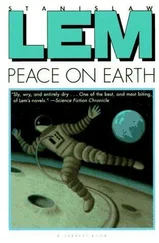Meanwhile the theory slipped through my fingers; I saw that actually it had been eluding me for quite some time, but I had not admitted this to myself. The work on it was extremely demanding — all the more difficult in that I had little stomach for it. As sometimes happens, the words I had spoken in my meeting with McMahon came back to haunt me. Often our fears are not altogether present, not dangerous, you could almost say, until we give them clear expression. This is exactly what happened to me. Frog Eggs without question now appeared to me to be a human artifact, the result of a false reading of the code. This was how I saw it: the Senders definitely had had no intention of sending us a Pandora’s box; but we, like burglars, forced the lock, and stamped upon the plundered contents everything that in Earth’s science was mercenary, predatory. And did not success in atomic physics (I thought) take place precisely in that area where the opportunity opened up for us to obtain the most destructive possible energy?
Nuclear reactors always limped behind the production of bombs; we had hydrogen warheads but still no hydrogen piles; the entire microworld revealed to man its interior — distorted by that one-sided approach — and therefore we knew far more about the strong interactions than about the weak. I discussed these topics with Donald; he did not agree with me, being of the opinion that if anyone should “shoulder the blame” for the “one-sidedness of physics” (though he did not believe in that one-sidedness, either), it was not we, but the world, by virtue of its structure. The simple fact was that it was easier, from any objective standpoint — easier if only by the law of least resistance — to destroy than it was to create. Destruction was a gradient consistent with the main direction of processes in the Universe, whereas creation always had to go against the current.
I reminded him of the Promethean myth. In his picture of things, the marches of science, worthy of respect and even reverence, should all converge, as at a source; but the myth praised not disinterestedly comprehending but seizing hold, not knowledge of but mastery over. This was the foundation of all empiricism. He said to me that with such suppositions I would delight a Freudian, seeing as I reduced the thirst for knowledge to aggression and sadism. I can see now that I had indeed lost a little of my common sense, my circumspection, and the coolness that comes from the directive of proceeding sine ira et studio — and that I had, with my speculations, shifted the “blame” from the unknown Senders onto humanity, incurable misanthrope that I was.
In the first week of November the apparatus began working, but the preliminary experiments, undertaken on a small scale, were unsuccessful: several times the detonation went so far out of control that it reached beyond the main shielding wall, and though it was minute, the leap in radiation hit 60 roentgens. It became necessary to put up around the shielding another, outer, barrier. Too massive a structure, now, to be concealed — and somehow Eugene Albert Nye, who never before had visited the physics labs, showed up several times at Donald’s. The fact that he asked no questions, but merely looked on and poked around, did not bode well. Finally Donald asked him to leave, telling him he was in the way. When I rebuked Donald for this step, he replied, calmer than I was, that one way or another things would be decided soon, and until then he would not let Nye in the door.
When I look back now, I see how foolishly we both behaved — how mindlessly, even. I still do not know what ought to have been done, but that conspiratorial activity — there is no other way to say it — served only to preserve the illusion that our hands were clean. We got in deeper and deeper. We could neither hide our progress nor — in the face of the pointlessness of keeping the secret — suddenly one day announce it. The announcing had to be done either immediately after the discovery of TX — or never. Both of these ways out, logical though they were, were closed to us. The awareness that the biophysicists, in another quarter, would be moving onto that “hot” ground made us hurry. Our fear for the fate of the world — because nothing less, after all, was at stake — caused, truly by reflex, our concealment of the research. To come out of hiding now would be to invite such shocked questions as “Well, fine, but why do you come to us with this now!” “You have, of course, the final results?” and “But what was your reason for not telling us at the beginning?” I would not have known what to reply.
Donald harbored the vague hope that on the large scale the effect might manifest a kind of “recoil” — the initial theory had pointed to that. But, first of all, the initial theory turned out to be useless, and, second, it opened a door to the acceptance of certain assumptions, which further down the road led to undesirable probabilities.
Baloyne I avoided during this period as much as possible, because my conscience was not clean regarding him. But he had other problems. Besides Lerner, we now were expecting a second “outsider”; both were to enlighten us with their presentations at the end of the month. This clear admission by Washington that it possessed its own experts on His Master’s Voice, and men, moreover, who had been working without any connection with us, put Baloyne in an extremely unpleasant and difficult position before all the research groups. Dill, Donald, and Rappaport (and I as well) felt, however, that he ought to carry his cross (that was the sort of language he used) to the end. Anyway, both of these visitors announced to us were minds of the first order.
There was no talk, now, of budget cuts for the Project. It appeared that if our uninvited consultants could not give the work a forward shove with their ideas (which seemed to me unlikely), the Project would go on by sheer inertia, because no one on high would dare to change the least thing in it — let alone talk of liquidating it.
Personal tensions developed in the Council: between Baloyne and Nye, first, since the latter must have known, we were convinced, of this spectral, second Project — His Master’s Ghost — yet, for all the man’s volubility, he had not once mentioned it. (But to Baloyne Nye was still the soul of politeness.) And there was tension between our “conspiracy of two” and, again, Baloyne, for he had got wind of something after all: sometimes I saw him following me with his eyes, as if waiting for an explanation or at least some hint. But I dodged the best I could — not too skillfully, I am sure, because playing such games had never been my strong point. Meanwhile, Rappaport held it against Rush that even he, the first discoverer, had not been informed of His Master’s Ghost. Thus the sessions of the Council became more than unpleasant, in an atmosphere of short tempers, suspicions, and low spirits. I slaved away at the programs for the machine, a waste of my time and strength since any programmer could have done them, but consideration for the “conspiracy” won out.
At last, I finished the calculations that Donald needed, but still he was not ready with the apparatus. Finding myself idle, for the first time since my arrival at the Project I tried watching television, but everything on it seemed to me unutterably phony and devoid of sense, the news programs included. I went to the bar, but could not stay there, either. Nervous, unable to sit still, I finally went to the computer center, shut myself up carefully, and began doing calculations that no one, this time, had required of me.
I employed, once more, the defiled (so to speak) formula of Einstein for the equivalence of mass and energy. I worked out the power available to the inverters and transmitters of the explosions at a distance equal to Earth’s diameter; some minor technical difficulties that cropped up with this occupied me — but not for long. An attack carried out with the TX effect made advance warning impossible. What would happen was simply that the ground under people’s feet would turn to solar lava. One also could produce an explosion not on Earth’s surface but beneath it, and at any depth, whereby shields of steel plate as well as the whole massif of the Rocky Mountains, which was supposed to protect the chiefs of staff in their great underground bunkers, would become meaningless. There could no longer be even the hope that the generals — those most valuable members of our society, if personal worth was to be measured according to the means invested in the preservation of one’s life and limb — would emerge, the only people left, on the radioactive, scorched surface of the planet, in order to begin the work (after removing their momentarily unnecessary uniforms) of rebuilding civilization from the bottom up. The most wretched denizen of the slums would be exposed equally now with the supreme commander of the nuclear forces.
Читать дальше












